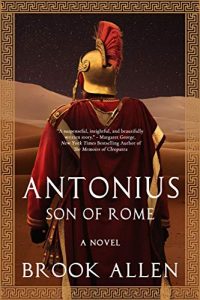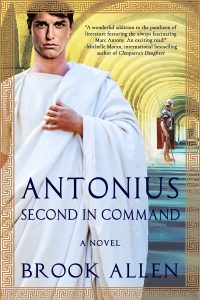13 Feb Author Interview Brook Allen Antonius Trilogy
INTRODUCTION

It is my pleasure to introduce Brook Allen, author of the Antonius Trilogy, historical fiction about Marcus Antonius (Mark Antony). Her first book, Antonius: Son of Rome, caught my attention when it was awarded the must-deserved 2019 Book of the Year Award by The Coffee Pot Book Club. Mark Antony is one of the most fascinating historical figures from Ancient Rome. He is an enigma because most of the accounts about him were written by his enemies. Author Brook Allen realistically captures the essence of Mark Antony and Roman politics. The second book, Antonius: Second in Command), is also an engaging, must-read book for those who love historical fiction set in ancient Rome.
Below you will find a brief biography, interview, and contact information.
BIOGRAPHY
Brook Allen has a passion for ancient history—especially 1st century BC Rome. Her current work is a trilogy on the life of Marcus Antonius—Marc Antony. The first installment, Antonius: Son of Rome was published on March 15, 2019. It follows Antony as a young man, from the age of eleven, when his father died in disgrace, until he’s twenty-seven and meets Cleopatra for the first time. Brook’s newest book is Antonius: Second in Command, dealing with Antony’s tumultuous rise to power at Caesar’s side and culminating with the bloody civil war against Brutus and Cassius.
AUTHOR INTERVIEW QUESTIONS:
Would you provide an overview of the books you’ve published in the Antonius series about Marcus Antonius who is considered one of history’s most controversial men?
I guess I’ve always felt a little sorry for Marcus (Marc Antony). Octavian not only demanded his death, but in treating his memory with damnatio memoriae—the damning of one’s memory, his statues and busts were destroyed, his name chiseled off of inscriptions, and even his birth date was designated as a day of “bad omens”. All that is pretty heavy stuff. To this day, he gets Classicists rattled, and they always have opinions about him. Usually it’s either “love him or hate him”!
Certainly, Marcus Antonius had an agenda, but truthfully, nobody knows what it was. There had to be reasons he acted as he did. In approaching his life story, I decided to begin at his father’s death, since it must have been a humiliation for his family. As my book Son of Rome progresses, the Antonii deal with repeated misfortune and humiliation. And all of this was going on in the middle of so much political and social upheaval—the Spartacan Revolt, the Catiline Conspiracy… Patricia Southern, who wrote a fantastic biography on Antonius said it best, stating that he grew up never seeing the Roman Republic work properly. The death throes of the Republic provide a thrilling and breathtaking panorama of events on which to depict his story since not much of his early years is known.
In my second book, Second in Command, Marcus comes into his own. This is where writers like Plutarch especially, kick in and give a lot more details about what he was doing—especially once he joins Caesar in Gaul. Second in Command is one fast-paced read. There’s scandal, political intrigue, tragedy (Marcus’s life was marred by multiple tragedies, poor guy!), and war. Battle scenes have become a personal hobby now and I actually enjoy writing them. Thank you, Adrian Goldsworthy—a man who knows Roman legions and warfare like the back of his hand.
The final book in my trilogy should be out a little later this year. I’m hoping by early fall. It will be tragic and dark, as that’s the sort of life Antonius endured in his later years. However, to lighten that is one of history’s most celebrated love stories; that of Antonius and Cleopatra. I am doing my best to treat it with justice and empathy. There were kids involved, sadly, and life at its best in the 1st century BC could be brutal. Expect plenty of warfare and emotional torment, both physical and propaganda-driven.
What inspired you to write about the legendary historical enigma, Marcus Antonius?
Way back in high school is where it all began. I had a fabulous Sophomore English teacher and she had us read Shakespeare’s Julius Caesar. By then, I’d already been bitten by the writing bug, but after studying it, I was hooked on Roman history. I knew I wanted to write on the 1st century BC/end of the Republic dilemma somehow.
Fast-forward now to 2005. I had just completed my Masters with an emphasis in Roman Studies and decided, “It’s time.” By then, I’d had enough life experiences and deep research into Roman culture that I felt as though I could manage the world-building aspect, which, to me—is possibly even more important to historical fiction writing than building character. Anyway, Robert Harris was in the midst of his Cicero trilogy, so Cicero was out. Several series had recently been done on Julius Caesar, who would have been a blast to write on. So, I skipped him. Honestly, I didn’t like Octavian enough to focus on him. I just kept coming back to Antonius. And I’m so glad I did. He’s been my close friend now for fifteen years and my husband even tolerates him well!
How much research was involved in writing your books?
If I was going to make this worthwhile… to succeed with this trilogy, then I had to build a world and character that was so believable and irresistible that people would have no choice but want to read it.
My parents were still alive when I began writing it, and they sent me to Egypt. It was the most incredible trip I’ve ever taken. I spent a week just in Alexandria, walking the beach, taking a boat out into the Great Harbor, exploring the foundations of the ancient Pharos Lighthouse inside Fort Qaitbay, and visiting helpful folks at the Center for Alexandrian Studies.
Naturally, Rome and Greece have been on my itinerary multiple times, and I even made a brief visit to Ephesus. For a guy who lived two-thousand years ago without jet service, Marcus got around! I have some incredible guide-friends now—two in Greece whom I depend on, and one in Rome. They have all been such integral resources for these books and walking ancient sites with them was an experience that I’ll never forget. Several times, either the Greek or Italian government had shut down sites I needed to see. However, with the help from my Classics professor, the Italian government, and even a humble security guard—I’ve been everyplace from Actium in western Greece to Taposiris Magna in Egypt, to the House of Livia in Rome!
Truthfully, I’m still researching, and even as I continue my drafting process, I sometimes take research breaks to fine-tune something I want to be sure of.
How did you go ABOUT researching the history, language, and culture of the 1st Century BC ancient Romans?
The Classics professor with whom I did my Masters thesis, Dr. Christina Salowey, provided me with a Latin book and I self-taught myself a few basics. Fortunately, I speak French, and that helped quite a bit. However, I’ll admit that I never got as far along with Latin as I wanted.
There is so much material out there and sometimes when writing you have to be careful not to “kitchen-sink”—stick in too much detail. Readers want to be immersed but not overwhelmed. When I did my Masters, I did it in order to write this trilogy. Everything I focused on had a place in my story. Once, while in Rome, I remember slipping on my sports sandals and jogging from the Palatine Hill in Rome all the way down to the Curia to determine how long it took to get there in a hurry! And I spent nearly a week in Pompeii, visiting that site multiple times with a friend, just to feel the pulse of ancient Rome. That was time very well-spent.
Were there any unexpected surprises about Marcus Antonius that you found in your research?
Indeed! Perhaps the very thing that is so surprising about him is that he’s still soooooo controversial. Classicists and historians either love him or hate him. After researching the guy for fifteen years, I see communication as having been his biggest issue. Poor Marcus lived in the wrong age. Today, he would’ve been on SKYPE in Greece, defending himself to the Senate in Rome, or on Twitter, tweeting about his REAL intentions regarding his plans in governing the East. Really, I think distance was one of the things that wound up defeating him in the end. Distance from Rome and not being able to be there to stand up for what he believed. Why didn’t he go back? Maybe it was due to Cleopatra… Who knows? I do know that he governed the East and that when Octavian finally took over, he didn’t make immediate changes. Something had to be going fairly well!
Is there any sub-character in the Antonius series that is your favorite? Explain why?
YES! I love Julia Antonia, Marcus Antonius’s mother. Granted, they don’t always see eye-to eye in Antonius: Son of Rome, but I think readers will come to love and respect her. She was one brassy lady, to say the least. During the proscriptions, she confronted a group of soldiers at her doorstep, hunting her brother down, opening her stola and challenging them to kill her first—the mother of their general—before forcing their way in to kill her brother. Needless to say, her brother was safe! Later, in the final book that I’m writing, she winds up on a pirate’s ship! This was a Roman matron—high-born! Ancient sources are chock-full of some pretty incredible stuff. Love it!
How often do your characters surprise you by doing or saying something totally unexpected?
When I have the time to really sit down and focus on a scene, that’s when it happens. And seldom during the first draft, either. It’s when I’m working on the second, third, fourth drafts that stuff just starts flowing and the characters just take total control. I start visualizing the scene and BOOM! For any author, that’s utter bliss. And in a way, when your characters speak to you and work through you like that, I guess it’s sort of creepy, too!
Have you received reactions/feedback to your work that surprise you? In what way?
This whole “being an author” thing has been mind-blowing in a lot of ways. I have a reader in Australia who has been so kind—so encouraging. She writes something positive to me almost weekly now. I don’t think there’s any way I could convey how much of a difference it makes when somebody believes in your work in that way. And here she is, literally on the other side of the world from me. And yet, we have this special connection. Then there’s a manager in my local Barnes & Noble who believes in hometown authors and completely supports my work. This guy has become a champion for me. When I walk in and see my books on his shelves, always facing out so that the cover shows… it seems like nothing to most people, but to an author? It means the world.
I think it’s these kindnesses that totally eclipse an agent’s rejection or overshadow negative reviews. Loyal readers truly have the power to make an author. I can see that now.
What are the most important traits you look for in a friend?
This one’s hard, as honestly, I’m pretty hard to pin-down and become really close to, friendship-wise. I suppose it would be somebody who has commonality with me in some way—like writing, perhaps. A person who’s forgiving and forbearing, for sure. I’m not always likable. That’s why my sweet husband it such a diamond.
If you could have one skill that you don’t currently have, what would it be?
I’ve always thought it would be super-cool to be able to communicate with animals. I’m talking Dr. Doolittle, here. I would LOVE to be able to touch a grizzly bear’s head, stroke it gently, and tell the biologist, “His tummy hurts because he’s been hibernating for seven months and hasn’t pooped in all that time! That’s the reason he’s so lethargic!” Wow. If I could understand animals, I could quit my day-job!
What might we be surprised to learn about you?
All of the riding scenes and cavalry/horse-related scenarios in my trilogy are from personal experience. Long, long ago, in a galaxy far, far away, I was an equestrienne and did pre-training for the Olympics. But again… that was LONG, long ago. However, my memory of riding and how it felt, and the way I trained— it brought a lot of fine-tuned action into my scenes with young Marcus.
What makes you laugh?
My husband. He’s hilarious—even when he doesn’t mean to be funny.
What simple pleasure makes you smile?
Just being with my dogs. I’m a dog-person to the max and I’d prefer being in their company any day compared to the company of people. Not that I’m anti-social or anything, but we introverted folk are like that!
You can contact Brook Allen and learn more about her books at:




No Comments